- Home
- H. P. Lovecraft
The Complete H.P. Lovecraft Reader (68 Stories)
The Complete H.P. Lovecraft Reader (68 Stories) Read online
The Complete H. P. LOVECRAFT Reader
(68 Stories Included)
***
CONTENTS:
The Nameless City
The Festival
The Colour out of Space
The Call of Cthulhu
The Dunwich Horror
The Whisperer in Darkness
Dreams in the Witch-house
The Haunter of the Dark
The Shadow over Innsmouth
The Shadow out of Time
At the Mountain of Madness
The Case of Charles Dexter Ward
Azathoth
Beyond the Wall of Sleep
Celephais
Cool Air
Dagon
Ex Oblivione
Facts Concerning the Late Arthur Jermyn and His Family
From Beyond
He
Herbert West: Reanimator
Hypnos
Imprisoned with the Pharaohs
In the Vault
Medusa's Coil
Memory
Nyarlathotep
Pickman's Model
Poetry of the Gods
The Alchemist
The Beast in the Cave
The Book
The Cats of Ulthar
The Crawling Chaos
The Descendant
The Doom That Came to Sarnath
The Dream Quest of Unknown Kadath
The Evil Clergyman
The Horror at Martin's Beach
The Horror at Red Hook
The Hound
The Lurking Fear
The Moon Bog
The Music of Erich Zann
The Other Gods
The Outsider
The Picture in the House
The Quest of Iranon
The Rats in the Walls
The Shunned House
The Silver Key
The Statement of Randolph Carter
The Strange High House in the Mist
The Street
The Temple
The Terrible Old Man
The Thing on the Doorstep
The Tomb
The Transition of Juan Romero
The Tree
The Unnamable
The White Ship
Through the Gates of the Silver Key
What the Moon Brings
Polaris
The Very Old Folk
* * *
THE NAMELESS CITY
When I drew nigh the nameless city I knew it was accursed. I was traveling in a parched and terrible valley under the moon, and afar I saw it protruding uncannily above the sands as parts of a corpse may protrude from an ill-made grave. Fear spoke from the age-worn stones of this hoary survivor of the deluge, this great-grandfather of the eldest pyramid; and a viewless aura repelled me and bade me retreat from antique and sinister secrets that no man should see, and no man else had dared to see..
Remote in the desert of Araby lies the nameless city, crumbling and inarticulate, its low walls nearly hidden by the sands of uncounted ages. It must have been thus before the first stones of Memphis were laid, and while the bricks of Babylon were yet unbaked. There is no legend so old as to give it a name, or to recall that it was ever alive; but it is told of in whispers around campfires and muttered about by grandams in the tents of sheiks so that all the tribes shun it without wholly knowing why. It was of this place that Abdul Alhazred the mad poet dreamed of the night before he sang his unexplained couplet:
That is not dead which can eternal lie, And with strange aeons death may die.
I should have known that the Arabs had good reason for shunning the nameless city, the city told of in strange tales but seen by no living man, yet I defied them and went into the untrodden waste with my camel. I alone have seen it, and that is why no other face bears such hideous lines of fear as mine; why no other man shivers so horribly when the night wind rattles the windows. When I came upon it in the ghastly stillness of unending sleep it looked at me, chilly from the rays of a cold moon amidst the desert's heat. And as I returned its look I forgot my triumph at finding it, and stopped still with my camel to wait for the dawn.
For hours I waited, till the east grew grey and the stars faded, and the grey turned to roseate light edged with gold. I heard a moaning and saw a storm of sand stirring among the antique stones though the sky was clear and the vast reaches of desert still. Then suddenly above the desert's far rim came the blazing edge of the sun, seen through the tiny sandstorm which was passing away, and in my fevered state I fancied that from some remote depth there came a crash of musical metal to hail the fiery disc as Memnon hails it from the banks of the Nile. My ears rang and my imagination seethed as I led my camel slowly across the sand to that unvocal place; that place which I alone of living men had seen.
In and out amongst the shapeless foundations of houses and places I wandered, finding never a carving or inscription to tell of these men, if men they were, who built this city and dwelt therein so long ago. The antiquity of the spot was unwholesome, and I longed to encounter some sign or device to prove that the city was indeed fashioned by mankind. There were certain proportions and dimensions in the ruins which I did not like. I had with me many tools, and dug much within the walls of the obliterated edifices; but progress was slow, and nothing significant was revealed. When night and the moon returned I felt a chill wind which brought new fear, so that I did not dare to remain in the city. And as I went outside the antique walls to sleep, a small sighing sandstorm gathered behind me, blowing over the grey stones though the moon was bright and most of the desert still.
I awakened just at dawn from a pageant of horrible dreams, my ears ringing as from some metallic peal. I saw the sun peering redly through the last gusts of a little sandstorm that hovered over the nameless city, and marked the quietness of the rest of the landscape. Once more I ventured within those brooding ruins that swelled beneath the sand like an ogre under a coverlet, and again dug vainly for relics of the forgotten race. At noon I rested, and in the afternoon I spent much time tracing the walls and bygone streets, and the outlines of the nearly vanished buildings. I saw that the city had been mighty indeed, and wondered at the sources of its greatness. To myself I pictured all the spendours of an age so distant that Chaldaea could not recall it, and thought of Sarnath the Doomed, that stood in the land of Mnar when mankind was young, and of Ib, that was carven of grey stone before mankind existed.
All at once I came upon a place where the bed rock rose stark through the sand and formed a low cliff; and here I saw with joy what seemed to promise further traces of the antediluvian people. Hewn rudely on the face of the cliff were the unmistakable facades of several small, squat rock houses or temples; whose interiors might preserve many secrets of ages too remote for calculation, though sandstorms had long effaced any carvings which may have been outside.
Very low and sand-choked were all the dark apertures near me, but I cleared on with my spade and crawled through it, carrying a torch to reveal whatever mysteries it might hold. When I was inside I saw that the cavern was indeed a temple, and beheld plain signs of the race that had lived and worshipped before the desert was a desert. Primitive altars, pillars, and niches, all curiously low, were not absent; and though I saw no sculptures or frescoes, there were many singular stones clearly shaped into symbols by artificial means. The lowness of the chiselled chamber was very strange, for I could hardly kneel upright; but the area was so great that my torch showed only part of it at a time. I shuddered oddly in some of the far corners; for certain altars and stones suggested forgotten rites of terrible, revolting and inexplicable nature and made me w
onder what manner of men could have made and frequented such a temple. When I had seen all that the place contained, I crawled out again, avid to find what the temples might yield.
Night had now approached, yet the tangible things I had seen made curiosity stronger than fear, so that I did not flee from the long mooncast shadows that had daunted me when first I saw the nameless city. In the twilight I cleared another aperture and with a new torch crawled into it, finding more vague stones and symbols, though nothing more definite than the other temple had contained the room was just as low, but much less broad, ending in a very narrow passage crowded with obscure and cryptical shrines. About these shrines I was prying when the noise of a wind and my camel outside broke through the stillness and drew me forth to see what could have frightened the beast.
The moon was gleaming vividly over the primitive ruins, lighting a dense cloud of sand that seemed blown by a strong but decreasing wind from some point along the cliff ahead of me. I knew it was this chilly, sandy wind which had disturbed the camel and was about to lead him to a place of better shelter when I chanced to glance up and saw that there was no wind atop the cliff. This astonished me and made me fearful again, but I immediately recalled the sudden local winds that I had seen and heard before at sunrise and sunset, and judged it was a normal thing. I decided it came from some rock fissure leading to a cave, and watched the troubled sand to trace it to its source; soon perceiving that it came from the black orifice of a temple a long distance south of me, almost out of sight. Against the choking sand-cloud I plodded toward this temple, which as I neared it loomed larger than the rest, and shewed a doorway far less clogged with caked sand. I would have entered had not the terrific force of the icy wind almost quenched my torch. It poured madly out of the dark door, sighing uncannily as it ruffled the sand and spread among the weird ruins. Soon it grew fainter and the sand grew more and more still, till finally all was at rest again; but a presence seemed stalking among the spectral stones of the city, and when I glanced at the moon it seemed to quiver as though mirrored in unquiet waters. I was more afraid than I could explain, but not enough to dull my thirst for wonder; so as soon as the wind was quite gone I crossed into the dark chamber from which it had come.
This temple, as I had fancied from the outside, was larger than either of those I had visited before; and was presumably a natural cavern since it bore winds from some region beyond. Here I could stand quite upright, but saw that the stones and altars were as low as those in the other temples. On the walls and roof I beheld for the first time some traces of the pictorial art of the ancient race, curious curling streaks of paint that had almost faded or crumbled away; and on two of the altars I saw with rising excitement a maze of well-fashioned curvilinear carvings. As I held my torch aloft it seemed to me that the shape of the roof was too regular to be natural, and I wondered what the prehistoric cutters of stone had first worked upon. Their engineering skill must have been vast.
Then a brighter flare of the fantastic flame showed that form which I had been seeking, the opening to those remoter abysses whence the sudden wind had blown; and I grew faint when I saw that it was a small and plainly artificial door chiselled in the solid rock. I thrust my torch within, beholding a black tunnel with the roof arching low over a rough flight of very small, numerous and steeply descending steps. I shall always see those steps in my dreams, for I came to learn what they meant. At the time I hardly knew whether to call them steps or mere footholds in a precipitous descent. My mind was whirling with mad thoughts, and the words and warning of Arab prophets seemed to float across the desert from the land that men know to the nameless city that men dare not know. Yet I hesitated only for a moment before advancing through the portal and commencing to climb cautiously down the steep passage, feet first, as though on a ladder.
It is only in the terrible phantasms of drugs or delirium that any other man can have such a descent as mine. The narrow passage led infinitely down like some hideous haunted well, and the torch I held above my head could not light the unknown depths toward which I was crawling. I lost track of the hours and forgot to consult my watch, though I was frightened when I thought of the distance I must have be traversing. There were changes of direction and of steepness; and once I came to a long, low, level passage where I had to wriggle my feet first along the rocky floor, holding torch at arm's length beyond my head. The place was not high enough for kneeling. After that were more of the steep steps, and I was still scrambling down interminably when my failing torch died out. I do not think I noticed it at the time, for when I did notice it I was still holding it above me as if it were ablaze. I was quite unbalanced with that instinct for the strange and the unknown which had made me a wanderer upon earth and a haunter of far, ancient, and forbidden places.
In the darkness there flashed before my mind fragments of my cherished treasury of daemonic lore; sentences from Alhazred the mad Arab, paragraphs from the apocryphal nightmares of Damascius, and infamous lines from the delirious Image du Monde of Gauthier de Metz. I repeated queer extracts, and muttered of Afrasiab and the daemons that floated with him down the Oxus; later chanting over and over again a phrase from one of Lord Dunsany's tales--"The unreveberate blackness of the abyss." Once when the descent grew amazingly steep I recited something in sing-song from Thomas Moore until I feared to recite more:
A reservoir of darkness, black
As witches' cauldrons are, when fill'd
With moon-drugs in th' eclipse distill'd
Leaning to look if foot might pass
Down thro' that chasm, I saw, beneath,
As far as vision could explore,
The jetty sides as smooth as glass,
Looking as if just varnish'd o'er
With that dark pitch the Seat of Death
Throws out upon its slimy shore.
Time had quite ceased to exist when my feet again felt a level floor, and I found myself in a place slightly higher than the rooms in the two smaller temples now so incalculably far above my head. I could not quite stand, but could kneel upright, and in the dark I shuffled and crept hither and thither at random. I soon knew that I was in a narrow passage whose walls were lined with cases of wood having glass fronts. As in that Palaeozoic and abysmal place I felt of such things as polished wood and glass I shuddered at the possible implications. The cases were apparently ranged along each side of the passage at regular intervals, and were oblong and horizontal, hideously like coffins in shape and size. When I tried to move two or three for further examination, I found that they were firmly fastened.
I saw that the passage was a long one, so floundered ahead rapidly in a creeping run that would have seemed horrible had any eye watched me in the blackness; crossing from side to side occasionally to feel of my surroundings and be sure the walls and rows of cases still stretched on. Man is so used to thinking visually that I almost forgot the darkness and pictured the endless corridor of wood and glass in its low-studded monotony as though I saw it. And then in a moment of indescribable emotion I did see it.
Just when my fancy merged into real sight I cannot tell; but there came a gradual glow ahead, and all at once I knew that I saw the dim outlines of a corridor and the cases, revealed by some unknown subterranean phosphorescence. For a little while all was exactly as I had imagined it, since the glow was very faint; but as I mechanically kept stumbling ahead into the stronger light I realised that my fancy had been but feeble. This hall was no relic of crudity like the temples in the city above, but a monument of the most magnificent and exotic art. Rich, vivid, and daringly fantastic designs and pictures formed a continuous scheme of mural paintings whose lines and colours were beyond description. The cases were of a strange golden wood, with fronts of exquisite glass, and containing the mummified forms of creatures outreaching in grotesqueness the most chaotic dreams of man.
To convey any idea of these monstrosities is impossible. They were of the reptile kind, with body lines suggestion sometimes the crocodile, sometimes the
seal, but more often nothing of which either the naturalist or the palaeontologist ever heard. In size they approximated a small man, and their fore-legs bore delicate and evident feet curiously like human hands and fingers. But strangest of all were their heads, which presented a contour violating all known biological principles. To nothing can such things be well compared--in one flash I thought of comparisons as varied as the cat, the bullfrog, the mythic Satyr, and the human being. Not Jove himself had had so colossal and protuberant a forehead, yet the horns and the noselessness and the alligator-like jaw placed things outside all established categories. I debated for a time on the reality of the mummies, half suspecting they were artificial idols; but soon decided they were indeed some palaeogean species which had lived when the nameless city was alive. To crown their grotesqueness, most of them were gorgeously enrobed in the costliest of fabrics, and lavishly laden with ornaments of gold, jewels, and unknown shining metals.
The importance of these crawling creatures must have been vast, for they held first place among the wild designs on the frescoed walls and ceiling. With matchless skill had the artist drawn them in a world of their own, wherein they had cities and gardens fashioned to suit their dimensions; and I could not help but think that their pictured history was allegorical, perhaps showing the progress of the race that worshipped them. These creatures, I said to myself, were to men of the nameless city what the she-wolf was to Rome, or some totem-beast is to a tribe of Indians.
Holding this view, I could trace roughly a wonderful epic of the nameless city; the tale of a mighty seacoast metropolis that ruled the world before Africa rose out of the waves, and of its struggles as the sea shrank away, and the desert crept into the fertile valley that held it. I saw its wars and triumphs, its troubles and defeats, and afterwards its terrible fight against the desert when thousands of its people--here represented in allegory by the grotesque reptiles--were driven to chisel their way down through the rocks in some marvellous manner to another world whereof their prophets had told them. It was all vividly weird and realistic, and its connection with the awesome descent I had made was unmistakable. I even recognized the passages.

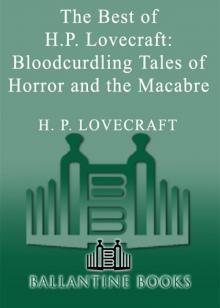 The Best of H.P. Lovecraft
The Best of H.P. Lovecraft The Definitive H.P. Lovecraft: 67 Tales Of Horror In One Volume
The Definitive H.P. Lovecraft: 67 Tales Of Horror In One Volume The Complete Works of H.P. Lovecraft
The Complete Works of H.P. Lovecraft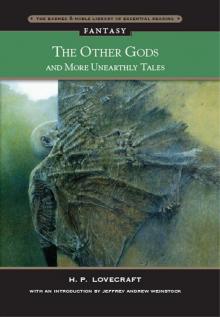 Other Gods and More Unearthly Tales
Other Gods and More Unearthly Tales Lovecraft's Fiction Volume I, 1905-1925
Lovecraft's Fiction Volume I, 1905-1925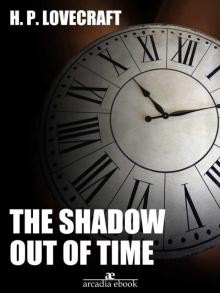 The Shadow Out of Time
The Shadow Out of Time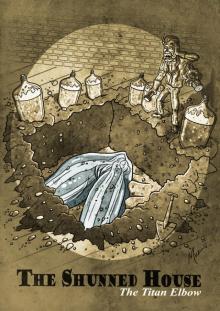 The Shunned House
The Shunned House Lovecraft's Fiction Volume II, 1926-1928
Lovecraft's Fiction Volume II, 1926-1928 The Thing on the Doorstep and Other Weird Stories
The Thing on the Doorstep and Other Weird Stories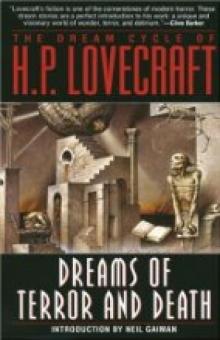 Dream Cycle of H. P. Lovecraft: Dreams of Terror and Death
Dream Cycle of H. P. Lovecraft: Dreams of Terror and Death Great Tales of Horror
Great Tales of Horror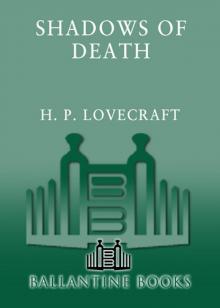 Shadows of Death
Shadows of Death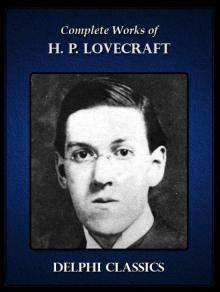 Delphi Complete Works of H. P. Lovecraft (Illustrated)
Delphi Complete Works of H. P. Lovecraft (Illustrated)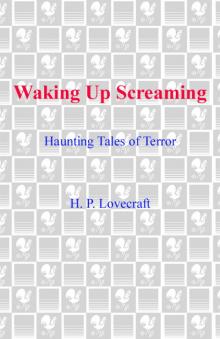 Waking Up Screaming: Haunting Tales of Terror
Waking Up Screaming: Haunting Tales of Terror H.P. Lovecraft Goes to the Movies
H.P. Lovecraft Goes to the Movies The Road to Madness
The Road to Madness The Complete H.P. Lovecraft Reader (68 Stories)
The Complete H.P. Lovecraft Reader (68 Stories)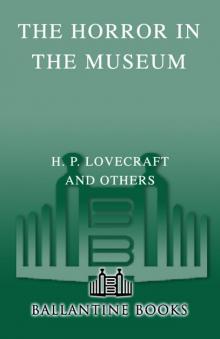 The Horror in the Museum
The Horror in the Museum Collected Fiction Volume 1 (1905-1925): A Variorum Edition
Collected Fiction Volume 1 (1905-1925): A Variorum Edition Lovecrafts_Fiction, vol.I_1905-1925
Lovecrafts_Fiction, vol.I_1905-1925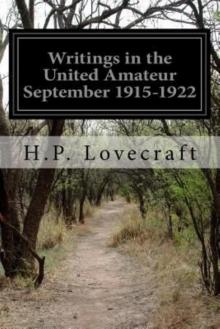 Writings in the United Amateur, 1915-1922
Writings in the United Amateur, 1915-1922 H.P. Lovecraft: The Complete Works
H.P. Lovecraft: The Complete Works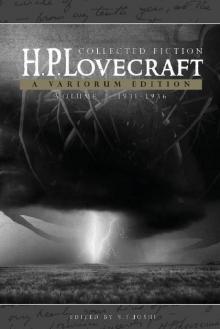 Collected Fiction Volume 3 (1931-1936): A Variorum Edition
Collected Fiction Volume 3 (1931-1936): A Variorum Edition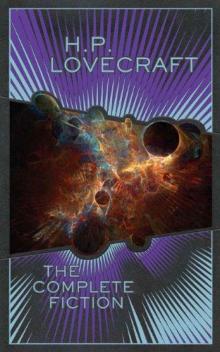 H.P. Lovecraft: The Complete Fiction
H.P. Lovecraft: The Complete Fiction Collected Fiction Volume 2 (1926-1930): A Variorum Edition
Collected Fiction Volume 2 (1926-1930): A Variorum Edition Yog Sothothery - The Definitive H.P. Lovecraft Anthology
Yog Sothothery - The Definitive H.P. Lovecraft Anthology The Complete H.P. Lovecraft Collection (Xist Classics)
The Complete H.P. Lovecraft Collection (Xist Classics)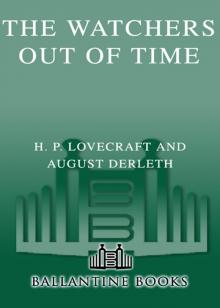 The Watchers Out of Time
The Watchers Out of Time Eldritch Tales
Eldritch Tales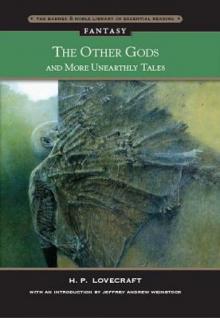 The Other Gods And More Unearthly Tales
The Other Gods And More Unearthly Tales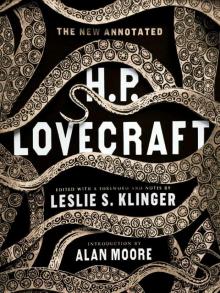 The New Annotated H. P. Lovecraft
The New Annotated H. P. Lovecraft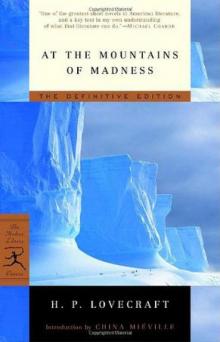 At the mountains of madness
At the mountains of madness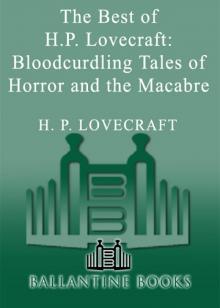 Bloodcurdling Tales of Horror and the Macabre
Bloodcurdling Tales of Horror and the Macabre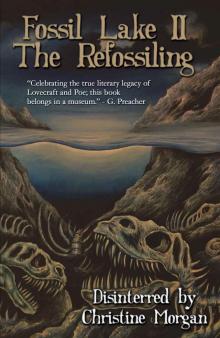 Fossil Lake II: The Refossiling
Fossil Lake II: The Refossiling Shadows of Carcosa: Tales of Cosmic Horror by Lovecraft, Chambers, Machen, Poe, and Other Masters of the Weird
Shadows of Carcosa: Tales of Cosmic Horror by Lovecraft, Chambers, Machen, Poe, and Other Masters of the Weird H. P. Lovecraft
H. P. Lovecraft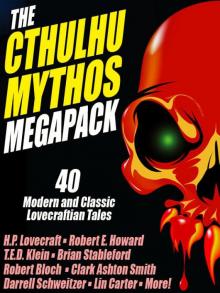 The Cthulhu Mythos Megapack
The Cthulhu Mythos Megapack The Complete H. P. Lovecraft Reader (2nd Edition)
The Complete H. P. Lovecraft Reader (2nd Edition)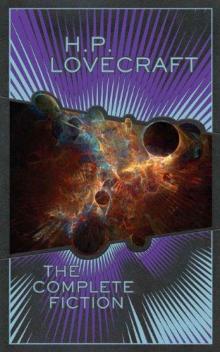 The Complete Fiction
The Complete Fiction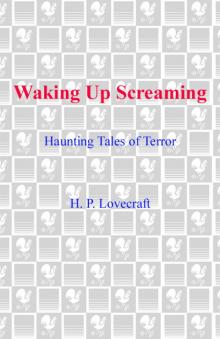 Waking Up Screaming
Waking Up Screaming Transition of H. P. Lovecraft
Transition of H. P. Lovecraft![[1935] The Shadow Out of Time Read online](http://i1.bookreadfree.com/i2/04/12/1935_the_shadow_out_of_time_preview.jpg) [1935] The Shadow Out of Time
[1935] The Shadow Out of Time The Horror Megapack
The Horror Megapack